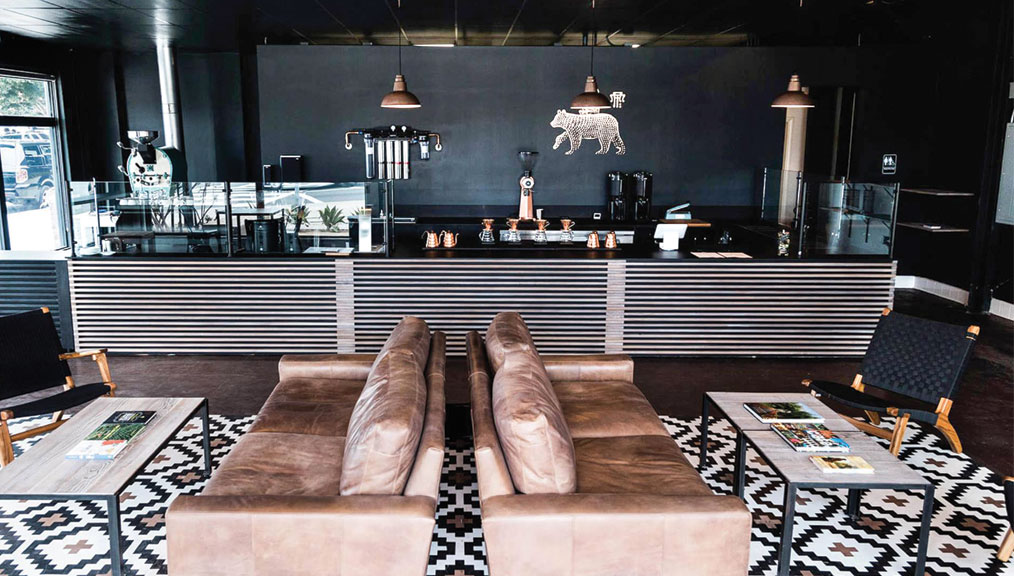[O]n the ocean-side outskirts of Los Angeles, a place where coffee-drinkers frantically click through mobile ordering apps to pick up their coffee to go, Andres Pineros focuses his energy on encouraging customers to sit and stay awhile at his new café, the Fika Company. “We try to have soft chairs and nice design and chill ambience,” he says. Plush cushions are only one part of the appeal of the café’s modern design. Set just off the Pacific Coast Highway in Redondo Beach, the Fika Company brings tastes of Swedish and Colombian culture to the beach town.
Pineros was born and raised in Colombia, but it wasn’t until he moved to Sweden that he built an appreciation for coffee. “Being in the culture of Sweden, I learned how to drink coffee—the coffee was super good,” says Pineros. When he returned to Colombia, he connected with friends who were working in the industry, and began forming plans to open a business of his own. “Everyone is connected and everyone knows almost everyone in the coffee industry in Colombia.”
Pineros opened Café Fika Company in 2012 in Villavicencio, Colombia. The pilot company used local coffee connections that provided the opportunity to build relationships with area farmers. But Pineros had a vision bigger than Colombia. Having attended music school in Los Angeles, Pineros wanted to one day return to California to make a living. After the successful launch of Café Fika Company, he decided the time was right to move operations to LA. The first US branch of the company opened this July, simply called the Fika Company.
At the Redondo Beach café, a custom matte-black La Marzocco Strada EE complements the space’s interior and exterior hue, while a copper Malhkönig EK 43 and a line of Kalita Wave pour-over brewers and kettles provide metallic accents throughout. Interlocking wooden slats warm the face of the bar, matching the soft brown leather of the sofas, and picking up chocolate flecks in the geometric-patterned rugs. The aesthetic is a far cry from the white spaces popular among specialty coffee shops, and the contrast is both intriguing and inviting. So is the relationship the Fika Company maintains with its farmers.
“The concept is bringing the farmer as close as possible to our customers,” says Pineros. The Fika Company works directly with three Colombian farmers: Cruz del Eden, in northern Tolima; El Reposo, in Santander; and Bello Horizonte, located twenty minutes from Pineros’s hometown, Villavicencio. Pineros explains that working with these farmers over the last four years has afforded him a degree of consistency and quality that he couldn’t get through less direct methods of sourcing.
These farmers also represent a new generation’s approach to farming: they don’t just grow coffee, they roast and brew their own crop too. Pineros will bring each farmer to Redondo Beach, similar to the model he ran in Colombia. When the farmers visit, Pineros plans to have them roast on the Diedrich IR-5 (painted black, of course) that stands in line among the equipment behind bar. He says having the farmers visit is like having one more roaster and one more barista behind the bar. While the farmers get to engage with the café side of business, customers also get the rare opportunity to have their coffee prepared by the farmer who grew it.


The close connection with their farmers opens a line of communication that helps the farmers improve their processes and helps the Fika Company offer better coffee to their customers. “We can tell them, ‘Oh, customers didn’t like that coffee that was a fifty-hour fermentation, let’s cut that,’” explains Pineros. “It’s a total constant feedback that makes us better.”
But the amazing transparency of the Fika Company’s sourcing is just one pillar of their identity. Their name represents the other. Pineros first fell in love with coffee in Sweden, where he learned about fika—the Swedish concept he describes as taking time to drink coffee with people that matter. The practice is encouraged in Swedish businesses, and many people take fika five to six times a day.
When customers at the Fika Company waiver when answering the question “for here, or to go?” baristas jump in and encourage people to stay and experience what fika means. “When people decide to sit for ten minutes, they’ll often end up staying for thirty minutes or longer. It’s an eye-opening experience for people,” Pineros says.
Whether customers choose to stay or go, they can enjoy authentic locally-made Swedish pastries. The shop offers other baked goods from Larder Baking Company, as well as vegan, soy-free, dairy-free, and gluten-free options from neighboring shop GinaMia’s. The Fika Company also house-brews its Nordic Lights cold-brew that’s crafted from a blend of direct-trade coffees and immersed for twenty-four to twenty-six hours.
The Fika Company opened only a few months ago, but has already seen an overwhelmingly positive response from the community. Pineros hopes to continue sharing his concept, from taking a time out to enjoy people and good coffee, to developing better relationships between farmers and the cafés that roast and sell their beans.
—Ellie Bradley is Fresh Cup‘s associate editor.















